



The production of a Queen's Blade anime builds on the fighting-fanservice genre championed by titles such as Ikkitousen and Tenjou Tenge and takes it to the most logical next step. The series, like the "visual combat books" preceding it, is a cynical marketing ploy, a multifaceted brothel catering to every fetish and deviance able to be safely sold to lonely, lewd or lascivious males. Discarding the comparatively coy allusions to naughtiness used in other series, Queen's Blade takes every opportunity to disrobe it's bevy of disproportionately curved females with frequent trips to hot springs, dunkings in hot oil or scattering any other liquid liberally on their persons.
This cavalcade of banality permeates the series from characters to plot
The series is perverse at it's best and represents the most saleable pornography possible: only just restraining itself from full-frontal nudity or explicit sex acts, still hiding behind outlandish situations or judiciously angled shots to retain the microscopic shred of dignity the protagonists may have. Eager not to be branded as cheap smut, there is a certain grotesque inventiveness to just how far character designs and scenes will be taken in order to eke out the most obvious innuendos or exploitive implications.
Please note: the remainder of this post contains images of nudity, if you are offended by these or are otherwise unable to view these images within your municipality due to laws or moral obligations, please do not proceed.
Read the rest of this entry
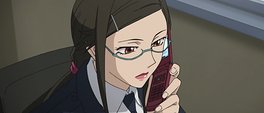
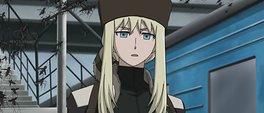

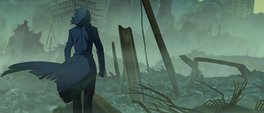
Darker than Black asked more questions than it reasonably answered so a second season is welcomed not simply for the chance to tie up loose ends. Lamentably, as so far this sequel is as obtuse as the first and omits an overview of the first season in favour of a cryptic flashback, some light romantic drama followed by some out-of-character fan service. The first three episodes present a haggard, visibly scarred Hei with ill-explored traumas inflicted in the intervening period between seasons; an incessantly annoying teenage girl with a flying squirrel sidekick and a selection of Contractors with a variety of outlandish remunerations. So far so Darker than Black.
Russian tundras and snow scattered towns are wonderfully atmospheric
It diverges little in both pace and atmosphere of the first series with the animosity between humans and Contractors still prevalent and mention of a shadowy organisation that seems to exist only to be enigmatic rather than any pragmatic reason. The two episode per story is dropped in favour of a more straightforward linear narrative that sees the teenage girl witness her home destroyed by a number of groups searching for (what else) a meteor fragment; through this she meets Hei and experiences a number of her friends either killed or turned into glassy eyed Contractors. Were it not for the shadow cast by the first season this could well be an intriguing genesis for a new series, there is however an all too present fear that BONES will be miring the already labyrinthine mythos and the conclusion will perhaps give a character but not a story ending.
Read the rest of this entry

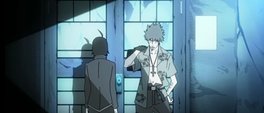
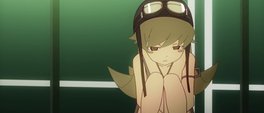

It is easy to fall in love with Bakemonogatari when looking at screenshots because for the most part, a collection of screenshots is all you receive with it - the most recent studio SHAFT / Akiyuki Shinbo series. If phrases were associated to anime, Bakemonogatari's would be "style over substance". So far does it take this maxim that it's difficult to describe any point where one feels connected or even mildly interested in the glossy puppets that fornicate with the bold colour palette.
from ice-queen cynicism to obnoxious trollop without missing a step
The story, as much as there is one, concerns Araragi who acts as a paranormal busy body for girls - ranging in age from barely legal to certainly illegal - suffering from a plethora of supernatural ailments. To aid him he regularly consults a destitute punk living in a derelict school with a outwardly pre-teen female vampire. The mythos and character back-stories are the sharpest part of the series and the afflictions suffered by the protagonists are certainly above the usual monster of the week fare, although this is perhaps thanks to the light novel source material than the anime adaptation. SHAFT and Shinbo plot their usual course and drench the series in faux abstract visuals - implying there is more meaning than is available and consequently presenting something vapid and soulless more than modern and engaging. Sudden cuts to single colour title cards start off as eccentric but quickly become a crutch to prop up the wildly varying production.
Read the rest of this entry

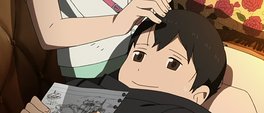


Tokyo Magnitude is the antithesis of most modern anime: sedate, unglossy and resolutely contained within the present time period. A premise concerning the terrifyingly plausible event of a high magnitude earthquake in urban Tokyo, it follows the journey of a young brother and sister - Yuuki and Mirai - and their chance meeting with courier Mari; miles from home this is their quest to reach their respective families. A bildungsroman veiled as a disaster series, the protagonist Mirai is taken from bratty and misanthropic to tolerating and finally, embracing.
beyond mediocrity - it transforms the blandly coloured drama into an emotive barrage
It would have been easy for the series to cast a bleak and unforgiving picture of humanity during a time of strife, but whether through slavish optimism or a cultural stubbornness, this is a story about people: at its best when meandering. The cast collides with friend and stranger alike, chance meetings that rarely last more than an episode but carefully craft and evolve Mirai's character from the bluntly cynical figure she starts out as. It is this endorsement of mankind which creates a rare empathy with nearly everyone introduced from the tirelessly working old man who lost his grandchildren to one of Mirai's classmates, bereaved by the loss of a parent. It is also this which enforces the near glacial pace that is the series biggest weakness.
Read the rest of this entry



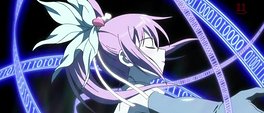
There are many good panty episodes in anime: episode four of Mai-HiME springs to mind as one, episode three of Yoku wakaru gendai mahou is not. Whereas the former had comic timing well beyond what one would have expected its studio to be able to produce, the latter is tawdry, boring tripe and is just the crowning achievement of an another muddled and bland instalment in the chicks-with-sticks and magic genre.
arcane magic of the hand-waving, runic variety and the "modern" magic of binary and cellphones
The series opens strongly with a battle against a sharply dressed wizard by two small girls who promptly get pummelled; rewinding six hours, the viewer is then treated to the first (and likely not the last) exposure of a criminally underage girl's posterior - while being chased by the impossibly sedate antagonist and engaging in some cryptic dialogue with other notable cast members. The public display of flesh is uncomfortable viewing, not only for the implied age of the participant but the futility of its inclusion - lacking any development of characters or story, it borders on pornography. From this low starting point, the first three episodes stumble haphazardly around like a late-night drunkard: first episode events are neither explained or explored and it's only upon reflection that the upcoming twist is made obvious. Elsewhere, characters who were no more than bystanders are now learning magic with the protagonist while incidents are nothing more than contrivances for character collisions. All of this set to a constant barrage of camera angles designed to place the poorly drawn breasts of the more well endowed females front-and-centre.
Read the rest of this entry



















